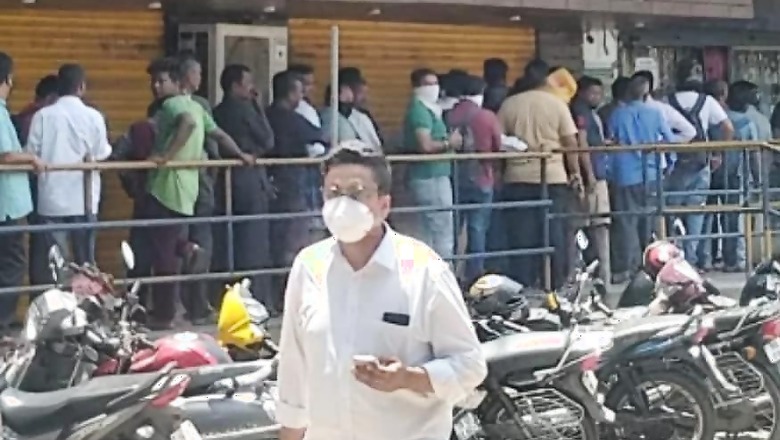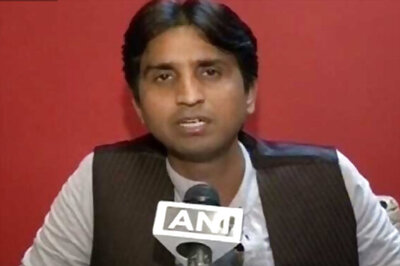
views
Sivashankar (33), Pradeep (25) and Sivaraman (25) died in Tamil Nadu's Chengalpattu district on Sunday after drinking varnish mixed with paint, unable to procure liquor to which they were reportedly addicted. This was the second such case of fatalities linked to alcohol-withdrawal issues in the state within days. Three men in Pudukkottai district had consumed aftershave lotion with an aerated drink on Friday and died.
The shutting down of outlets of Tamil Nadu State Marketing Corporation (TASMAC), which has monopoly over sale of alcohol in the state, because of the Covid-19 lockdown has had adverse reactions, and not just in economic terms.
According to experts, it's just the 'tip of the iceberg'. TASMAC sales are a huge revenue earner for the Tamil Nadu government, depicting how severe alcohol issues are in the state. The sudden closing down of liquor outlets are thus set to create plenty of withdrawal challenges.
"Withdrawal management is very important in alcohol deaddiction," KNS Varadhan, chairman of Chennai-based Freedom Care rehabilitation centre, tells News 18. "Once a continuous drinker stops suddenly, there will be major withdrawal symptoms like palpitation, hypertension, restlessness, irritation, anger, sleeplessness, vomiting and even fits/epilepsy. They need medical attention and counselling. The issue is not so serious even for some other drug addiction, but alcohol withdrawal is a serious issue."
Varadhan, who has been in the field of drugs and alcohol-addiction rehabilitation for more than two decades, is one of the many experts to call for the government to be proactive. The need of the hour, he says, is to be open and understanding about the issue.
The Kerala government set an example, going as far as to even ordering to supply liquor to drinkers with withdrawal symptoms on doctor's prescription. The move, however, was stalled by the Kerala high court. Karnataka is reportedly planning to open up liquor shops for three hours per day once the lockdown ends.
"There is a stigma attached with such issues; nobody comes forward and says 'I have alcohol issues'. Out of 100 people, only two people come on their own," Varadhan points out.
"The government should announce openly that if anyone needs any help, they should seek help from government hospitals. There are a few government deaddiction centres in Chennai. They also have psychiatrists. Private nursing homes and clinics are not functioning. The government should form a separate wing for deaddiction and work out on this aspect."
Officials say even if the Tamil Nadu government hasn't gone the Kerala way, it is aware of the potential problems and is working towards solutions already.
The government has set up mental health helplines, which are also open to people facing severe withdrawal issues.
The Greater Chennai Corporation, for example, has set up a Covid-19 tele-counselling centre to provide 'psychosocial' support to people suffering from various conditions. With support from the faculty of the social work department of Loyola college, the centre has a team of 24 doctors and 90 volunteers, apart from an engineering department, to assist people calling in with various problems. The volunteers include social workers and mental health professionals.
Gladson Xavier, an assistant professor who is coordinating the entire team, says they are yet to receive calls for alcohol issues but expects them to come in "anytime" as the city and the state brace for stiffer challenges.
"We've spoken to over 22,500 people and regularly follow up with around 12,500 people. We've not yet got calls related to alcohol issues, but this is very much expected. This will come anytime," he says. "Given the mass-scale drinking here, it's a small number now (people who have died due to alcohol withdrawal). however, it's only the tip of the iceberg. We have to pay a lot of attention to this. People are so used to TASMAC, and now it's closed. There are reports that illicit liquor is also doing rounds. This is going to be a huge problem, we should fix it right now. The corporation is also thinking along those lines. We are ready to help with crisis counselling."
Xavier calls for people to be open about their issues and call the helpline, pointing out that not everyone who has such problems needs to be hospitalised for treatment. However, it's easier said than done in a society where such conditions carry a stigma.
#GCC cares for you!A network of professionals is working round the clock towards safeguarding and supporting the mental health of our Chennai residents, during the lockdown!We are #HereForYou!Thanks to @lcchennai#Covid19Chennai#ChennaiCorporation pic.twitter.com/fckwyb7Cdd— Greater Chennai Corporation (@chennaicorp) April 5, 2020
Dr Pradeep Selvaraj, team leader of the Covid-19 tele-counselling centre and district programme officer of Chennai, says the government has all facilities and specialists to help people in need.
"We are doctors and we know how to ask them if they have alcohol-withdrawal symptoms. We won't ask them bluntly but hint and find out whether they were/are dependent. When we ask them directly, we won't get the real answer. If we socialise with them, we can find out if they have symptoms," he explains.
"That's the reason the IMH (Institute of Mental Health) has published numbers for counselling. When the substance (alcohol etc) is not available, it's the medicines that will help. The deaddiction steps/procedures either through medicines or counsellors, if they go to a stage where they have to be hospitalised, there are treatments. We can identify those cases if they go to the extreme and put them in IMH if needed."
Another related issue is a potential increase in crime rates; there have already been reports of burglary attempts at wine shops in the state.
"I'm hearing that they are selling liquor in black market," says Varadhan. "I don't know how this liquor is coming in, but it has added more burden on drinkers. People are spending more money on this, and there's a possibility of increase in crime to get liquor, because they need more money."
Varadhan says that this is also an opportunity for the government to do what it has been promising for quite some time - implement phased prohibition. Alcohol prohibition was a factor the last time the state went to polls, in 2016. After coming into power, the late J Jayalalithaa-led AIADMK had ordered step-by-step prohibition.
"This is a good opportunity for the government to reduce outlets in the long run. The government is saying that it would bring prohibition step by step. This is the right time to do that," says Varadhan. "It can reduce the outlets and also reduce the timings. This kind of opportunity can also help people quit drinking totally. The government should tap into that and think about prohibition."


















Comments
0 comment